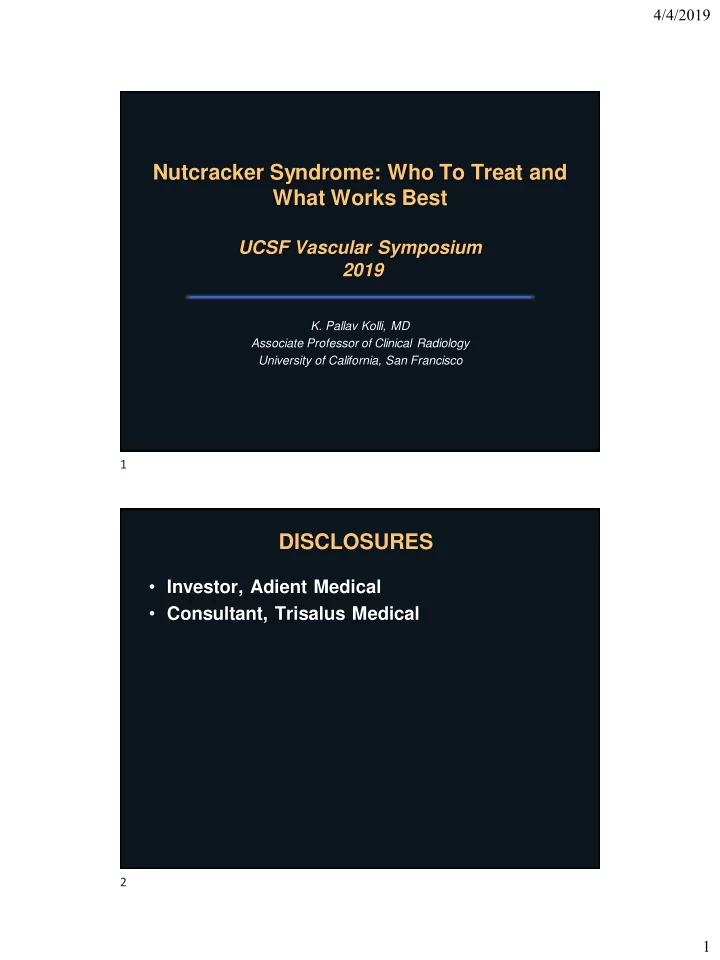

4/4/2019 Nutcracker Syndrome: Who To Treat and What Works Best UCSF Vascular Symposium 2019 K. Pallav Kolli, MD Associate Professor of Clinical Radiology University of California, San Francisco 1 DISCLOSURES • Investor, Adient Medical • Consultant, Trisalus Medical 2 1
4/4/2019 THE NUTCRACKER SYNDROME • Flank pain • Hematuria (microscopic or macroscopic) • Orthostatic proteinuria • Pelvic pain or varicocele Quality of Life Problem 3 ANATOMIC CONSIDERATIONS: PCS Anterior Nutcracker Posterior Nutcracker Shi Y e ta l. Clinical Radiology 2018 4 2
4/4/2019 ANATOMIC CONSIDERATIONS: SMA SYNDROME Lamba R et al. Radiographics 2014 5 WHO DEVELOPS NCS? • Prevalence unknown – Young/middle-aged, F > M? • Overlap exists between symptomatic and asymptomatic patients with similar imaging findings – 1957 May and Thurner described findings in 430 cadavers • 22% cadavers had intraluminal thickening directly related to external compression of L iliac vein between R iliac artery against 5 th lumbar vertebral body – Nutcracker Phenomenon seen on 11-27% of CT scans 6 3
4/4/2019 HOW DO WE DIAGNOSE NCS? Ananthan K et al. Eur J Vasc Endovasc Surg 2017 7 HOW DO WE DIAGNOSE NCS? Normal Nutcracker PHENOMENON 8 4
4/4/2019 HOW DO WE IDENTIFY NCP? Ratio of LRV hilum:narrowing > 4.9 Sensitivity 66.7%, Specificity 100%* Fong JKK AJR 2014 9 HOW DO WE IDENTIFY NCP? BEAK Sign Kim KW et al. Eur J Radiol 2011 10 5
4/4/2019 HOW DO WE IDENTIFY NCP? Normal 11 HOW DO WE IDENTIFY NCP? Aortomesenteric Angle Normal ~90° < 41° 100% sensitive, 55.6% specific* Fong JKK AJR 2014 12 6
4/4/2019 MEASUREMENTS, MEASUREMENTS, MEASUREMENTS Y un SJ et al Abdom Radiol 2016 13 CAN WE DISTINGUISH NCP AND NCS? Enlarged perirenal and/or gonadal vessels Eliahou R et al. RadioGraphics 2012 14 7
4/4/2019 DO COLLATERALS HELP? Y un SJ et al Abdom Radiol 2016 15 HOW DO WE DIAGNOSE NCS? Ananthan K et al. Eur J Vasc Endovasc Surg 2017 16 8
4/4/2019 VENOGRAPHY 17 VENOGRAPHY 18 9
4/4/2019 VENOGRAPHY 19 IVUS 20 10
4/4/2019 NCP -> NCS Ananthan K et al. Eur J Vasc Endovasc Surg 2017 21 Treatment of Nutcracker Syndrome Velasquez CA et al. J Vasc Surg: Venous and Lym Dis 2018) 22 11
4/4/2019 Treatment of Nutcracker Syndrome Conservative approach • Growing individuals may experience resolution because of an increase in intra-abdominal and retroperitoneal fat -> emphasize weight gain • Some propose conservative management for 24 months in adolescents and 6 months in adults Ananthan K et al. Eur J Vasc Endovasc Surg 2017 23 Treatment of Nutcracker Syndrome N = ~300 Velasquez CA et al. J Vasc Surg: Venous and Lym Dis 2018 24 12
4/4/2019 Treatment of Nutcracker Syndrome Velasquez CA et al. J Vasc Surg: Venous and Lym Dis 2018 25 Treatment of Nutcracker Syndrome Velasquez CA et al. J Vasc Surg: Venous and Lym Dis 2018) 26 13
4/4/2019 Endovascular Treatment of NCS Lamba R et al. Radiographics 2014 27 Endovascular Treatment of NCS 28 14
4/4/2019 Endovascular Treatment of NCS Wu Z et al. J Vascu Surg: Venous and Lym Dis 2016 29 Migration Isn’t Immediate!!! Wu Z et al. J Vascu Surg: Venous and Lym Dis 2016 30 15
4/4/2019 Treatment of Nutcracker Syndrome Velasquez CA et al. J Vasc Surg: Venous and Lym Dis 2018) 31 Open Surgical Repair: LRV Transposition Erben Y J Vasc Surg: Venous and Lym Dis 2015 32 16
4/4/2019 Open Surgical Repair: LRV-T Variants Erben Y J Vasc Surg: Venous and Lym Dis 2015 33 Open Surgical Repair: Mayo Clinic Series (37 patients over 20 years) Erben Y J Vasc Surg: Venous and Lym Dis 2015 34 17
4/4/2019 Open Surgical Repair: Mayo Clinic Series (37 patients over 20 years) Erben Y J Vasc Surg: Venous and Lym Dis 2015 35 Open Surgical Repair: Mayo Clinic Series (37 patients over 20 years) Erben Y J Vasc Surg: Venous and Lym Dis 2015 36 18
4/4/2019 Treatment of Nutcracker Syndrome Velasquez CA et al. J Vasc Surg: Venous and Lym Dis 2018 37 Extravascular Stent Placement Chen F-M et al. Urology 2019 38 19
4/4/2019 Extravascular Stent Placement Wang S-Z Journal of Endourology 2015 39 Extravascular Stent Placement Wang S-Z Journal of Endourology 2015 40 20
4/4/2019 Conclusions • Like all compression syndromes, there is an important distinction to be made between permissive anatomy and disease state • Initial conservative management, prolonged in adolescents • The optimal intervention is not entirely clear – *I am not in favor of primary endovascular stenting based on risk of migration, timing of migration, and uncertainty of long-term patency 41 THANK YOU! 42 21
Recommend
More recommend